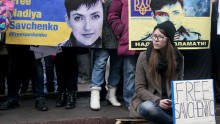On April 18, a Kyiv court pronounced the verdict against the Russian Special Forces soldiers Alexander Alexandrov and Yevgeny Yerofeyev who may potentially be exchanged for Nadia Savchenko. Our readers will probably recall that on March 22, the Donetsk City Court of Russia’s Rostov region sentenced the Ukrainian pilot Nadia Savchenko to 22 years in prison on trumped up charges of murdering two Russian journalists who provided media support for the Russian invasion and spread false information about alleged crimes of “Ukrainian punitive troops.” Russia’s special cynicism with which it approached the Savchenko case is worthy of our attention. It kidnapped a Ukrainian citizen, accused her of clearly implausible crimes, and assigned the case to the court of a Russian city which is a namesake of the Ukrainian regional center which is now occupied by Russian troops. Thus, the media mention the small Russian city of Donetsk when covering the Savchenko affair. The sentence came into force on April 5, and Savchenko is waiting for transportation to her place of imprisonment. Savchenko refused to lodge an appeal, while her lawyers said she might be exchanged, including for the Russian Special Forces soldiers now held as prisoners of war (POWs) in Ukraine.
Detained Russian GRU servicemen are actually no big deal. Such Russian “tractor drivers” (as they are sometimes called by the Russian authorities) have been caught quite often. Then, they are quite often exchanged in discreet deals, without bringing much public attention. But the problem is that these clandestine exchanges prevent our side from gathering evidence of the Russian aggression. This is an extremely important topic, because actions of the occupiers should be evaluated at all levels of the judiciary, including international courts. It was by accident that Yerofeyev and Alexandrov, both caught in the city of Shchastia, came into the focus of the Ukrainian media after a Ukrainian soldier posted the story on the Internet. Therefore, their fate took a completely different route. Let us recall that the Russian GRU servicemen were detained in a combat zone on May 16, 2015 and taken to Kyiv where they were given medical treatment and prosecuted on charges of illegally crossing the border and killing a Ukrainian soldier.
To exchange Savchenko for Yerofeyev and Alexandrov is to recognize her as a prisoner of war, which implies recognizing the ongoing war as such, something that has not been done in our relations with Russia for some reason. Moreover, it would mean labeling Russia as aggressor and occupier, not in words but in deeds. Of course, the Russian side is extremely cautious about such an approach. However, what levers are still available in Ukraine to secure the release of our most famous POW? Experts are unanimous in stating that international pressure is the only way to go.

Photo by Artem SLIPACHUK, The Day
Let us recall one more detail of the Savchenko trial which has remained outside public knowledge. The leader of the so-called “Luhansk People’s Republic” Ihor Plotnytsky, who once visited the trial in the Russian city of Donetsk accompanied by a number of bodyguards, offered Savchenko a prospect of “common political future.” This dialog between Plotnytsky and Savchenko, which was looked on with a frank amazement by judges and others present at the trial, does not deserve a thorough analysis. However, the detail itself is important in that it shows that Plotnytsky, the Kremlin’s underling who played a fatal role in Savchenko’s story, could not allow himself such words without corresponding “permission.” Thus, not only Ukrainians, but inhabitants of the Kremlin, too, deliberate on Savchenko’s “political future.” For them, to release Savchenko is to launch her real political career. And in this regard, her role can be quite unpredictable.
Incidentally, now that we discuss the Russian invasion of Ukraine, we should recall that foreign media directly point to the facts of Ukraine getting shelled from the Russian side of the border. In 2014, when Ukrainian troops were closing the ring around the Russian armed gangs and controlled almost the entire perimeter of the Ukrainian-Russian border, frequent shellings of the Ukrainian military’s positions from across the border started. We emphasize that these attacks occurred regularly and at some stage played a decisive role in the occupation of a part of the Donbas. It was precisely then that Savchenko was taken prisoner. The head of the international investigative journalism organization Bellingcat said in an interview with the German TV channel ARD that over 300 MLRS attacks on Ukrainian territory were carried out from the Russian soil in the summer of 2014. Based on satellite data, they were able to establish the facts of Russia’s military aggression against Ukraine. This is what Ukraine has long demanded from the international community, urging it to use the means of satellite recording. Google Maps allow one to detect camouflaged MLRS positions as well. It shows that Russian Grads fired in five directions.
The main uncertainties include not only whether the release of Savchenko is possible, but also whether Ukrainian politicians are afraid of her return. Certainly, she became a political figure while being held in Russian dungeons. That is why backstage operators on both sides of the theater of war look at her with a view to the future. Meanwhile, she only gets worse health-wise.
At the same time, the request for urgent debate on the Savchenko case disappeared from the list of issues on the agenda to be approved by the spring session of the Parliamentary Assembly of the Council of Europe. That is, the question of Savchenko’s release will not be considered at the session separately, but rather in the context of all other matters affecting Ukraine, to be considered on April 21. The assembly intends to hear the report entitled “Humanitarian Concerns with Regard to People Captured during the War in Ukraine.”








